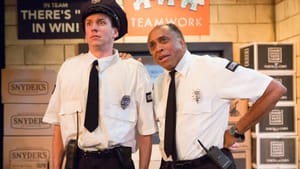Stay in the Loop
BSR publishes on a weekly schedule, with an email newsletter every Wednesday and Thursday morning. There’s no paywall, and subscribing is always free.
Tackling a meaty subject gingerly
Fringe 2015: 1812 Production's 'Shoplifters'

The question of who is stealing from whom tries to be the central issue of Shoplifters, an expanded sitcom masquerading as a play that opens the 1812 Productions season on the eve of the 2015 Fringe Festival. The play’s good-humored attempt to tackle a serious subject never quite gets at the heart of the problem, although characters talk about corporations stealing from the people and whether theft is ever okay. At one point, I even thought of Edward Snowden and the theft of data that he, Robin Hood-like, distributed to its victims.
The play begins when Dom (Daniel Frederick), a security guard in training, apprehends Alma (Mary Martello), an experienced shoplifter, and her naïve accomplice, Phyllis (Marla Burkholder), who are trying to steal meat from the supermarket. Dom wants to throw the book at them, but experienced security guard Otto (Johnnie Hobbs Jr.), his mentor, wants to calm him down and make the whole thing go away. This is, after all, almost his last day on the job, and it turns out he has a few ideas that really don’t match well with his responsibility to look out for his employer’s best interests.
The jokes come fast and furious with a few plot twists thrown in now and then. The audience laughs appreciatively at the right moments, although the play repeats itself again and again. Scenes end with blackouts, and when the lights come back up, time has passed and the location has changed from office to storage room and back again. It’s a combination sitcom and series of skits that amuses and surprises, but ultimately doesn’t quite work.
Caricatures, not characters
The advantage of a sitcom is that after an episode or so the characters are givens; we know who they are, and they don’t have to be explained each time. But when a play behaves like a sitcom, character development is sacrificed for a laugh. That’s the problem here.
Martello, a really strong character actor who often amazes with her versatility, plays Alma, the shoplifter with a mission, so seriously it’s hard to understand her motivations. She’s bright, she’s determined, and she’s hungry for life, but in the end she’s very one-note. Hobbs, as the security guard with a soul, has a gentle manner and tries to calm things down, but he’s a romantic and his philosophy doesn’t always make sense. Burkholder’s Phyllis is inexperienced and desperate and the sort of person you wouldn’t want as an accomplice. And Frederick as the security guard on probation who wants to bring sinners to Jesus is consistently weird and wonderful.
She’s bright, she’s determined, and she’s hungry for life, but in the end she’s very one-note. Hobbs, as the security guard with a soul, has a gentle manner and tries to calm things down, but he’s a romantic and his philosophy doesn’t always make sense. Burkholder’s Phyllis is inexperienced and desperate and the sort of person you wouldn’t want as an accomplice. And Frederick as the security guard on probation who wants to bring sinners to Jesus is consistently weird and wonderful.
Last year, I was beginning to be a Daniel Frederick groupie after seeing him in The Hound of the Baskervilles, Arcadia, and Mickle Street. In all of these he had an irresistible boyish charm that imbued his characters with good humor. Here he takes a much more broadly comic approach, and the charm is left behind. Maybe it’s a sign of his talent that I found the character so annoying, but I longed for fewer tics and more lightness in his performance.
Overall, playwright Morris Panych missed an opportunity to flesh out the characters into human beings rather than caricatures who spout funny lines. Each has a fascinating backstory, doled out in dribs and drabs, which does keep us wondering if any of the stories are true. But even if only some of them are, the characters are more interesting people than they are allowed to be in the script as written. Does Alma have cancer and is she someone who makes sure the hungry get fed, or is she just a con artist? Is it really Phyllis’s birthday, and is that why she took off work? Why has Otto grown tired of protecting his wealthy corporate employer? And why has Dom, a foster child with a wonky eye, decided to be a security guard?
What would the Occupy movement say?
The theft of a steak feels dated in today’s ecologically conscious world. Does a steak really represent decadence? As much as the characters talk about a 16-ounce ribeye, looking at a slab of meat seems repulsive rather than enticing. It’s one of those concepts that probably seemed hilarious in the writers’ room, but less so on the stage.
Our current awareness of income inequality means that we understand that not everyone has steak for dinner. But it also raises the question of whether we should, any of us, have steak when we look at the true cost to the planet of our eating habits. And then there’s the question of what it means to live fully. Can we go out and grab whatever we want without paying for it? Or do we have to follow the rules, color within the lines, and take whatever we can without dreaming of something more, even if that is a steak specially cut just for us?
What, When, Where
Shoplifters by Morris Panych. Jennifer Childs directed. 1812 Productions. Through September 20, 2015 on the Acadia Stage at Arden Theatre Company, 40 N. 2nd Street, Philadelphia. 1812 Productions: 1812productions.org or 215-592-9560; Arden Theatre: ardentheatre.org or 215-922-1122. Presented as part of the 2015 Fringe Festival; fringearts.com or 215-413-1318.
Sign up for our newsletter
All of the week's new articles, all in one place. Sign up for the free weekly BSR newsletters, and don't miss a conversation.

 Naomi Orwin
Naomi Orwin